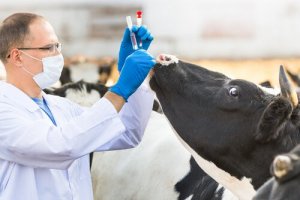Veterinary Immunology: Preventing and Treating Diseases


Written and verified by biochemistry Luz Eduviges Thomas-Romero
When you hear the words ‘veterinary immunology’, you might start thinking about your pet’s allergies. Or, maybe, you associate it loosely with something like arthritis. As it happens, this field of study touches all areas of animal health, but it relates specifically to the diagnosis, prevention, treatment, and control of infectious and autoimmune diseases.
And it doesn’t just deal with household pets either. Vets who work in this field also work with farm animals, wild animals, and even animals used in scientific research.
In these present times, terms such as ‘immune system’, ‘vaccines’, and ‘prevalence’ are obviously everywhere. What many people don’t know is that there is a whole branch of veterinary medicine dedicated to this discipline too. Today, we’re going to have a closer look at veterinary immunology.

Vaccines are a product of veterinary immunology
The prevalence of diseases in animals poses a threat to both their breeding and also public health. Since their discovery, vaccines have been key to controlling various infectious animal diseases. The obvious examples that you can probably think of might be influenza A or swine flu, both of which are zoonotic diseases that can infect humans.
To achieve an effective vaccination strategy requires paying close attention to several factors, such as the quality of the vaccine and the method of application. It’s also important to check that it works correctly, for example, by verifying the presence of antibodies in blood.
Veterinary immunology, therefore, is concerned with all these issues, as well as the development of new vaccines and the effect of adjuvants on previous immunizations.

Veterinary immunology on pets and farm animals
An animal’s immune system uses various mechanisms to protect the body. Firstly, there’s the innate immune system, which is all of the things that are present before exposure to infection. These include:
- Physical barriers such as skin and mucosa
- Molecules in the blood such as the complement system
- Phagocytes, which ingest harmful cells or bacteria
- Cytokines, which are proteins that travel in the blood and direct the immune response, such as interferons
Then, there is the adaptive immune system, which consists of mechanisms that are induced or stimulated by exposure to infection. They react specifically to the infection in question. This is how vaccines can be effective in protecting the body from possible infections.
Vaccines expose the immune system to weakened or deactivated forms of an infection. The animal’s body is then able to recognize and fight the infection without needing to be infected first.
In the field of diagnosis, veterinary immunology concerns itself with the detection of pathogens, such as viruses, bacteria, and parasites by using serology. It also aims to develop new diagnostic methods and use laboratory processes to determine sensitivity to antibiotics.

Immunology is vital for animals at every stage of their life
Small differences in the immune system can be the difference between life and death for young animals. For example, ruminant animals are born without antibodies. This is because the placenta doesn’t allow them to be passed from the mother’s blood. As a result, they’re highly dependent on the IgA-type antibodies which they get from colostrum contained in their mother’s milk.
Immune diseases
Sometimes, the immune response itself can cause adverse effects. Allergies are a classic example of this. Other potential consequences include infections like arthritis, Caprine arthritis encephalitis, and canine distemper.
Modern-day biotechnology and our increased understanding of the immune system have allowed us to develop very effective vaccines. And, as the coronavirus pandemic has shown, this detection and management of infectious agents in the wild could be crucial for managing future viral outbreaks.
When you hear the words ‘veterinary immunology’, you might start thinking about your pet’s allergies. Or, maybe, you associate it loosely with something like arthritis. As it happens, this field of study touches all areas of animal health, but it relates specifically to the diagnosis, prevention, treatment, and control of infectious and autoimmune diseases.
And it doesn’t just deal with household pets either. Vets who work in this field also work with farm animals, wild animals, and even animals used in scientific research.
In these present times, terms such as ‘immune system’, ‘vaccines’, and ‘prevalence’ are obviously everywhere. What many people don’t know is that there is a whole branch of veterinary medicine dedicated to this discipline too. Today, we’re going to have a closer look at veterinary immunology.

Vaccines are a product of veterinary immunology
The prevalence of diseases in animals poses a threat to both their breeding and also public health. Since their discovery, vaccines have been key to controlling various infectious animal diseases. The obvious examples that you can probably think of might be influenza A or swine flu, both of which are zoonotic diseases that can infect humans.
To achieve an effective vaccination strategy requires paying close attention to several factors, such as the quality of the vaccine and the method of application. It’s also important to check that it works correctly, for example, by verifying the presence of antibodies in blood.
Veterinary immunology, therefore, is concerned with all these issues, as well as the development of new vaccines and the effect of adjuvants on previous immunizations.

Veterinary immunology on pets and farm animals
An animal’s immune system uses various mechanisms to protect the body. Firstly, there’s the innate immune system, which is all of the things that are present before exposure to infection. These include:
- Physical barriers such as skin and mucosa
- Molecules in the blood such as the complement system
- Phagocytes, which ingest harmful cells or bacteria
- Cytokines, which are proteins that travel in the blood and direct the immune response, such as interferons
Then, there is the adaptive immune system, which consists of mechanisms that are induced or stimulated by exposure to infection. They react specifically to the infection in question. This is how vaccines can be effective in protecting the body from possible infections.
Vaccines expose the immune system to weakened or deactivated forms of an infection. The animal’s body is then able to recognize and fight the infection without needing to be infected first.
In the field of diagnosis, veterinary immunology concerns itself with the detection of pathogens, such as viruses, bacteria, and parasites by using serology. It also aims to develop new diagnostic methods and use laboratory processes to determine sensitivity to antibiotics.

Immunology is vital for animals at every stage of their life
Small differences in the immune system can be the difference between life and death for young animals. For example, ruminant animals are born without antibodies. This is because the placenta doesn’t allow them to be passed from the mother’s blood. As a result, they’re highly dependent on the IgA-type antibodies which they get from colostrum contained in their mother’s milk.
Immune diseases
Sometimes, the immune response itself can cause adverse effects. Allergies are a classic example of this. Other potential consequences include infections like arthritis, Caprine arthritis encephalitis, and canine distemper.
Modern-day biotechnology and our increased understanding of the immune system have allowed us to develop very effective vaccines. And, as the coronavirus pandemic has shown, this detection and management of infectious agents in the wild could be crucial for managing future viral outbreaks.
All cited sources were thoroughly reviewed by our team to ensure their quality, reliability, currency, and validity. The bibliography of this article was considered reliable and of academic or scientific accuracy.
- Charley, B. (1996). The immunology of domestic animals: its present and future. Veterinary immunology and immunopathology, 54(1-4), 3-6.
- Schmitt, B., & Henderson, L. (2005). Diagnostic tools for animal diseases. Revue scientifique et technique-Office international des épizooties, 24(1), 243.
This text is provided for informational purposes only and does not replace consultation with a professional. If in doubt, consult your specialist.








